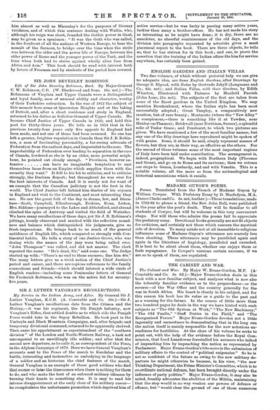Life of Sir John Beverley Robinson, Bart. By Major - General C.
W. Robinson, C.B. (W. Blackwood and Sons. 16s. net.)—The Robinsons of Virginia and Upper Canada were a distinguished and loyal family, men of unusual ability and character, worthy of their Yorkshire extraction. In the war of 1812 the subject of this memoir bore arms at Queenston Heights and at the taking of Detroit, and, after a short residence and study in England, returned to his duties as Solicitor-General of Upper Canada. He became Chief Justice of Upper Canada in 1829, and held this post for thirty-three years. He tells us in 1854 that in the previous twenty-four years only five appeals to England had been made, and not one of these had been reversed. No one has left a greater, brighter reputation in Canada than Sir J. B. Robin- son, a man of fascinating personality, a far-seeing advocate of Federation from the earliest days, and Imperialist to the core. The improbability of Federation ever leading to separation in the case of Canada, bordered as she is by an older, more powerful neigh- bour, he pointed out clearly enough. " Provinces, however ex- tensive can have no imaginable temptation to cast themselves loose from an Empire which supplies them with the security they want." It fell to his lot to criticise, and to criticise strongly, the Durham Report; but throughout he was ever for the best interests of Canada. And it is surely not for want of an example that the Canadian judiciary is not the best in the world. The Chief Justice left behind him diaries of his sojourn in England and visit to the Continent, and most interesting they are. He saw the great folk of the day in drama, law, and litera- ture—Scott, Campbell, Ellenborough, Erskine, Kean, Liston, Mrs. Siddons—journeyed to the Lakes and Abbotsford, and abroad climbed the spire of Antwerp and visited the field of Waterloo. We have many recollections of these days, yet Sir J. B. Robinson's jottings, keenly observant and marked with the reflective sound- ness and balance which distinguished his judgments, give us fresh impressions. He brings back to us much of the general untidiness of English life, which compared so strongly with Con- tinental habits. He tells a story of one Justice Grove, who was dozing while the names of the jury were being called over. "John Thompson" was called, and did not answer. The clerk repeated the name. "He's dead, Sir," said some one. The Judge started up with: "There's no end to these excuses; fine him 40s." The many letters give us a vivid notion of the Chief Justice's period and career, and there are copious references to the family connections and friends—which should interest a wide circle of English readers—including some Peninsular letters of General Sir Frederick Robinson, who was on the active list for seventy- five years.
SIR J. LUTHER VAUGHAN'S RECOLLECTIONS.






















































 Previous page
Previous page